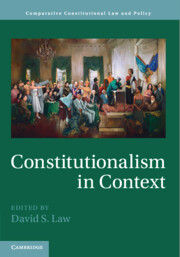Book contents
- Reviews
- Constitutionalism in Context
- Comparative Constitutional Law and Policy
- Constitutionalism in Context
- Copyright page
- Dedication
- Contents by Topic
- Contents by Region
- Figures
- Tables
- Contributors
- User’s Guide and Preface
- Abbreviations
- I Introduction to the Field
- 1 Introduction: Pedagogy and Conceptualization of the Field
- 2 The State of the Field
- 3 Methodology and Research Design
- II Concepts and Definitions
- III Constitutional Drafting and Revision
- IV Constitutional Adjudication and Interpretation
- V Rights
- VI Structure
- VII Challenges to Liberal Democratic Constitutionalism
- Index
1 - Introduction: Pedagogy and Conceptualization of the Field
from I - Introduction to the Field
Published online by Cambridge University Press: 17 February 2022
- Reviews
- Constitutionalism in Context
- Comparative Constitutional Law and Policy
- Constitutionalism in Context
- Copyright page
- Dedication
- Contents by Topic
- Contents by Region
- Figures
- Tables
- Contributors
- User’s Guide and Preface
- Abbreviations
- I Introduction to the Field
- 1 Introduction: Pedagogy and Conceptualization of the Field
- 2 The State of the Field
- 3 Methodology and Research Design
- II Concepts and Definitions
- III Constitutional Drafting and Revision
- IV Constitutional Adjudication and Interpretation
- V Rights
- VI Structure
- VII Challenges to Liberal Democratic Constitutionalism
- Index
Summary
This introductory chapter uses the framework of pedagogical choice to articulate and compare competing visions of how the field should be conceptualized and taught. Part 2 explicates the practical challenge that renders pedagogy in the field of comparative constitutional law unusually difficult – namely, the problem of capacity. Part 3 articulates and evaluates five competing models of pedagogy, which might be called instrumentalism, tourism, immersion, abstraction, and representation. Each model is defined by a distinctive set of pedagogical goals and a practical strategy for pursuing those goals in the face of the problem of capacity. Part 4 uses the contents of Constitutionalism in Context to illustrate how the representation model might be implemented in textbook form, and what intellectual and pedagogical benefits might result. Many of the representation model’s unique benefits stem from the fact that it invites and even demands that we explore what might be called boundary cases – namely, extreme, novel, or otherwise nonstandard cases that require us to test or apply familiar concepts and strategies in unfamiliar ways. Part 5 concludes by arguing that the challenges of teaching comparative constitutional law call for pedagogical pluralism.
Keywords
- Type
- Chapter
- Information
- Constitutionalism in Context , pp. 3 - 22Publisher: Cambridge University PressPrint publication year: 2022

